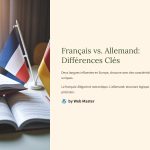 French and German are two of the most influential languages in Europe, each with unique linguistic characteristics, cultural significance, and global reach. If you’re considering learning one of them, understanding their differences can help you choose the right one for your goals. While French is often seen as elegant and romantic, German is known for its logical structure and precision. This article will compare these languages in pronunciation, grammar, vocabulary, and practical use to help you make the best decision.
French and German are two of the most influential languages in Europe, each with unique linguistic characteristics, cultural significance, and global reach. If you’re considering learning one of them, understanding their differences can help you choose the right one for your goals. While French is often seen as elegant and romantic, German is known for its logical structure and precision. This article will compare these languages in pronunciation, grammar, vocabulary, and practical use to help you make the best decision.

Pronunciation: Which Language Sounds More Appealing?
French pronunciation is fluid, with a melodic and often nasal quality. The language has many silent letters, liaisons, and vowel combinations that create smooth transitions between words. French vowels can be tricky, especially nasal vowels like on and an, which don’t exist in English.
German, on the other hand, is more phonetic, meaning words are generally pronounced as they are written. However, the language has complex consonant clusters and unique sounds like ch in ich or ach, which can be challenging for non-native speakers. The stress in German words is more predictable, usually falling on the first syllable, making it easier to learn pronunciation rules.
If you prefer a language with consistent pronunciation rules, German might be the better choice. However, if you enjoy the rhythmic and smooth sounds of a language, French is more appealing.
Grammar Complexity: Which One Is Harder?
French grammar is complex, with numerous verb conjugations and gendered nouns. There are 17 verb tenses, many of which are used in everyday speech. Additionally, French has irregular verbs that require memorization, and the use of subjunctive mood can be difficult for English speakers.
German grammar is also challenging, but in different ways. The biggest difficulty is the case system, which changes the endings of words depending on their function in a sentence. German has four cases (nominative, accusative, dative, and genitive), making sentence structure more flexible but also more difficult to master.
While French has simpler sentence structure but more complex verb conjugations, German offers strict grammatical rules that, once learned, can be applied consistently.

Vocabulary: Which One Is More Familiar?
French shares a significant amount of vocabulary with English due to the Norman conquest of England in 1066. Words like restaurant, déjà vu, fiancé, and bureau come directly from French. In fact, about 30% of English words have French origins, making vocabulary acquisition easier for English speakers.
German vocabulary is more distinct, though English and German are both Germanic languages. Some words are recognizable due to shared roots, like Haus (house) and Wasser (water). However, German compound words can be very long, such as Donaudampfschifffahrtsgesellschaftskapitän (Danube steamship company captain), which can be intimidating for beginners.
If you’re looking for a language with more familiar vocabulary, French is the better choice. However, if you enjoy logical word-building and compound words, German is fascinating.

Practical Use: Which Language Is More Useful?
French is spoken in over 29 countries across Europe, Africa, and North America. It is an official language of international organizations like the United Nations, the European Union, and the International Olympic Committee. Learning French is beneficial for careers in diplomacy, fashion, gastronomy, and international business.
German is the most spoken native language in Europe, with over 100 million speakers. It is the dominant language in Germany, Austria, and Switzerland, which are economic powerhouses in the European Union. German is essential in fields like engineering, science, and finance.
If you plan to work in international business, diplomacy, or travel to multiple continents, French is a strong choice. If your focus is on European industries, engineering, or science, German is more practical.

Cultural Influence: Which Language Has a Greater Impact?
French culture is known for its contributions to art, literature, cinema, and cuisine. Learning French gives access to famous works by authors like Victor Hugo and Marcel Proust, as well as world-renowned films and culinary traditions. Paris, the capital of France, is often seen as the cultural capital of the world.
German culture is deeply rooted in philosophy, classical music, and science. Thinkers like Kant, Nietzsche, and Marx shaped modern philosophy, while composers like Beethoven, Bach, and Mozart revolutionized classical music. Additionally, Germany has a strong scientific heritage, with many Nobel Prize winners.
If you are drawn to literature, cinema, and fashion, French might be your preferred language. If you admire philosophy, classical music, and scientific achievements, German has a lot to offer.

Which Language Should You Learn?
Choosing between French and German depends on your personal interests, career goals, and linguistic preferences.
- Learn French if:
- You want to communicate in multiple continents.
- You are interested in fashion, cuisine, or diplomacy.
- You prefer a melodious and fluid-sounding language.
- Learn German if:
- You plan to work in Europe, especially in engineering or finance.
- You enjoy structured grammar with clear pronunciation rules.
- You admire philosophy, classical music, or scientific research.
Ultimately, both languages are valuable and rewarding to learn. The best choice depends on what excites and motivates you the most.
*Capturing unauthorized images is prohibited*





